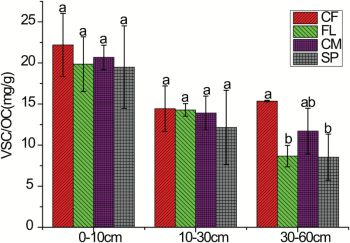
As one of the most abundant aromatic compounds in the terrestrial ecosystem, lignin has long been considered as the major source of stable organic carbon in soil. Its content and degradation status has vital influence on the size and stabilization of soil carbon pool.
Dr. WANG Xinggang under the supervision of Prof. LIU Feng from Wuhan Botanical Garden of Chinese Academy of Sciences chose four major plant communities in subtropical mix forests in Badagongshan (BDGS) National Nature Reserve in central China, i.e. Carpinus fargesii (CF), Fagus lucida (FL), Cyclobalanopsis multinervis (CM) and Schima parviflora (SP), to investigate the influence of plant communities and soil depth on the distribution and characteristics of lignin.
Researchers found that lignin content and chemical signature of plant litter varied among plant communities. Plant community affected lignin content in deep soil, but in the top two layers no significant difference was observed. The differences in lignin chemistry among plant communities in soils inherited some of the biochemical signature of lignin in litter, but the magnitude decreased.
Lignin content decreased with soil depth, but the biochemical signature of lignin was not significantly different among soil layers for all communities.
These results suggested that lignin inputs and soil eluviation played important roles to the distribution and characteristics in subtropical forest soil lignin. The results were published in Journal of Plant Ecology.
This study was funded by the National Natural Science Foundation of China and the Chinese National Key Development Program for Basic Research.

Figure: Lignin contents in different soil depths in the four plant communities. CF and FL are deciduous species, CM and SP are evergreen species. (Image by WANG Xinggang)

86-10-68597521 (day)
86-10-68597289 (night)

86-10-68511095 (day)
86-10-68512458 (night)

cas_en@cas.cn

52 Sanlihe Rd., Xicheng District,
Beijing, China (100864)

